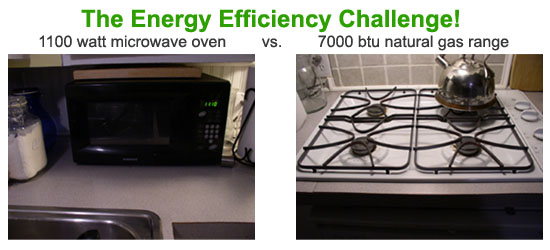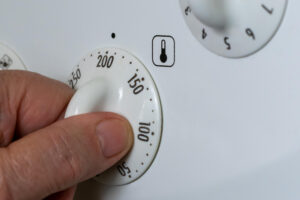Home Energy Experiment 1: Which cooks more efficiently, a microwave or gas range?
Last updated on March 10th, 2024 at 03:26 pm

There is a debate in the home energy community over what to do if given the choice between using a microwave oven to cook versus a gas powered range. My obvious advice is this: it really depends on what is being cooked and how much is being prepared. All meals are not created equally.
It is a given that for the most part a microwave will cook something in a shorter time. However, in doing so, it uses quite a bit of energy. Let’s assume for argument’s sake that we are comparing an 1100 watt microwave oven that is 100% efficient. In other words, at 100% power, it uses 1100 watts of energy exactly.
Let’s further assume the burner on the gas range we are comparing it to is a standard 7000 btu burner that is 90% efficient. So, 7000 btu are consumed, but 6300 btu goes to usable heat.
And finally, let’s assume that we are making frozen mashed potatoes, a family sized serving.
According to the instructions, you can microwave it for 11 minutes on high.
That’s 0.198 kwh of energy (electricity) you used. We get this figure by multiplying 1100 watts by the number of hours we used it. Since it was 11 minutes, we convert 11 minutes to hours by dividing 11/60. This gives us .18. So, multiply .18 by 1100. This is the watts used over an hour. Since the energy company bills you by kwh we divide that by 1000.
Okay, now we turn to the gas range. It takes about 15 minutes for the potatoes to be heated thoroughly.
That’s 0.017 ccf of natural gas used. We get this by taking out 7000 btu rating and dividing it by 1031 which is the number of btu in a ccf of natural gas. Then, we divide that by 100 (since ccf is measured in hundreds) and multiply it by the number of hours. In our case, 15 minutes is a nice even .25 hours.
You can see that it looks like we’re talking apples and oranges. One is measured in watts, the other is measured in ccf.
Here’s where you grab your gas bill and find out how much you are being charged. Let’s assume that you are charged $1.29 per ccf of natural gas, with a $0.37 delivery charge per ccf. And for electricity, lets assume you are charged $0.10 per kwh with a $0.03 delivery charge per kwh.
This means we are billed about $0.03 for the microwave usage when we add up the figures.
Coincidentally, we are also billed $0.03 for the natural gas usage.
It looks close. To find out which is more efficient, we extend these figures out. Let’s say for the sake of cost analysis that we do this everyday for a year. Now this will never happen, but we’re assuming this so we can blow up the price proportionally and see which one actually costs more.
Over a year, the microwave will cost $9.95 if used daily for 11 minutes on high.
Over a year, the range will cost $10.32 if used daily for the 15 minutes required.
So, cooking this food comes out in a statistical tie, with a slight edge to the microwave.
But…what if it only takes 11 minutes on the range as well? What happens to the yearly numbers then? (The daily figures won’t change because we’re dealing in small fractions.)
The microwave, as stated, takes $9.95 out of your pocket.
The gas range costs $7.43.
Interesting! So if we can get our food to cook faster (as fast as it would in the microwave) it becomes more efficient to cook on the range! We can do this through covering with lids and maybe turning off the burner a little early when covered.
Let’s look at another common use: boiling water for tea.
An 1100 watt microwave takes 2 minutes to heat a cup of water to near boiling.
The 7000 btu burner takes about 5 minutes to heat 4 cups of water to about the same temperature in a covered kettle.
Again, doing the same math…
It costs less than a cent to heat in the microwave. It costs a little over 1 cent on the range, but makes 4x the amount.
If we blow it out to a yearly cost…
Its about $1.66 for the microwave, $3.30 for the range.
But remember, the range heated 4 cups of water to the microwave’s one.
Bottom line: If you only have 1 cup of tea or need 1 cup of boiling water, use the microwave. Otherwise its more efficient to heat several cups at once on the range.
Why did we do this?
I wanted to see which was more efficient, plain and simple. Your results may vary depending on the efficiency of your equipment, the age, the power, etc. You can see what a difference an efficient stove and range makes though. The range slightly outperforms a microwave in terms of efficiency – especially when dealing with slightly larger servings. This surprised me, as I always had the perception that natural gas was more expensive than electricity. Turns out it isn’t the case given the numbers.
Stay tunes and look for the next experiment!



One thought on “Home Energy Experiment 1: Which cooks more efficiently, a microwave or gas range?”